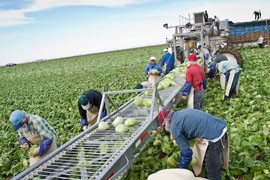Cronkite News has moved to a new home at cronkitenews.azpbs.org. Use this site to search archives from 2011 to May 2015. You can search the new site for current stories.
As harvest season looms, farmers worry about finding enough workers
WASHINGTON – With harvest season for many crops approaching, farms in Arizona need workers to help bring the crops in.
But that help is getting harder to find, farmers say, as patchwork immigration laws and federal visa issues often get in the way.
“There’s never been a greater need for federal action on immigration reform,” said Nan Stockholm Walden, vice president at Farmers Investment Co., which farms 7,000 acres of pecans in Arizona’s Santa Cruz Valley. “If we want to be in charge of our food security and our economy, we need to support immigration reform for agriculture.”
Walden was one of several farmers around the country who joined a conference call Wednesday in which they detailed their struggles in filling skilled farm positions traditionally taken by immigrant workers.
The call, organized by the National Immigration Forum, included farmers from Arizona, North Carolina, New York and Washington, all of whom sounded a similar theme.
“Immigration policy has devastated the skilled labor force that we have relied on for the last 20 years,” said Ralph Broetje, president of Broetje Orchards in Washington state.
Broetje said he needs 800 to 1,000 workers to harvest his apple orchard, but is currently 500 workers short. His harvest began four weeks ago and still has two months left.
Walden said she needs 50 to 60 seasonal employees to help with her company’s pecan harvest in Arizona in November. But laws targeting immigrants, like Arizona’s SB 1070, have created an “unpleasant climate” that leads immigrants to seek work in other states or even Canada, she said.
Joe Sigg, director of government relations for the Arizona Farm Bureau, agreed that there has been a noticeable increase in immigrants leaving Arizona to seek work in other states.
Walden said Farmers Investment Co. complies with immigration and employment laws and was one of the first Arizona businesses to voluntarily use E-verify, but she is not always happy with how those laws are enforced. She pointed to the I-9 audits, that can result in a business having its license suspended for six months after the first offense and revoked after a second.
Jason Resnick, a vice president and general counsel of the Western Growers Association, recognizes the legal challenges employers and workers sometimes face, but said there may also be other factors involved.
Resnick said the birth rate in Mexico has declined over the past decade, the Mexican economy has improved and there are now more education opportunities in Mexico.
Still, he said, his association has been asking for an immigration reform solution that works for agriculture since 1986, when the Immigration Reform and Control Act passed.
“There is no doubt labor-intensive agriculture depends on foreign workers. Always has and always will,” Resnick said. “That production is going to be outsourced to Mexico, Central America, South America, Asia, so we are going to end up importing our food supply to a much greater extent than we already do.”
Most agreed that U.S. workers are either unwilling to take the jobs for the wages offered or, as Broetje said, they “realize after a day or two that it’s hard work.”
Walden said Arizona business leaders are starting to wake up to the positive impact immigrant workers have on agriculture and related industries such as trucking, retail groceries, restaurants and the hospitality industry.
“There is hopefully a realization that this is a much broader issue and one that needs to be addressed for all our economy,” Walden said.
Broetje predicted that the shortage of immigrant workers would put some growers of out of businesses if Congress doesn’t address the situation. Walden agreed that congressional action is needed.
“We feel strongly that never has there been a greater need for federal leadership and immigration reform,” she said.







